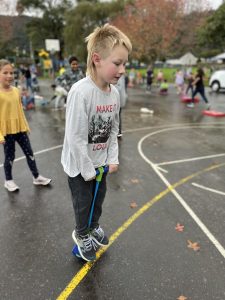By Scott McLeod – Sports
Play is important for our health and wellbeing, we want to get our kids out exploring and being active.
Play is essential for our cognitive, physical, social and emotional development. It builds fundamental physical literacy, fosters creativity and innovation and builds our ability to identify and manage risk.
Play contributes to not only children’s lives but also the well-being of whānau and the wider community.
Play is where tamariki practice life.
Last month Wā Ora Montessori were lucky enough for the Hutt City Council to bring the Pukutākaro program to our school. Pukutākaro is a project which promotes free play – independent of adult support. Hutt City Council parked their van up and placed their ‘wow’ items and ‘big ticket’ sports gears in our school courts and encouraged students to interact with the gear in a way that is personal and meaningful to them. Through the process we saw cooperation, negotiation, and sometimes conflict. Arming our children with the skills to navigate these situations is very important. It was great to see our
tamariki playing more often and interacting with different children throughout the school.
Montessori values the importance of play for learning, believing that children have a drive to explore and learn from their environment and acknowledged play as the ideal way to provide that opportunity. The pukutākaro program offered our students the opportunity for movement, sensory exploration and hands-on experiences in a relaxed environment. The students were able to be independent and think for themselves through using their own imaginations without the pressure of competition and to play at their own pace with their friends.
The flexible nature of play supports all children by following the individual child however, not all play styles will be suitable for all children; some children like rough play e.g. rugby, whilst others may prefer solitary play or co-operative fantasy play. For us teachers it offered a valuable chance to sit back and observe and interpret the activities the children adapted. It allowed us to follow the child’s play rather than impose our own rules or agenda on the play. Montessori advocated that adults caring for children should resource the environment to allow play to develop naturally and flourish independently. Elements such as freedom of choice, repetition, exploration, active hands-on experiences and peer-to-peer learning highlight a strong symbiosis between Montessori education and play-based learning.
Maria Montessori wrote ‘Grown-ups think of play as a purposeless occupation that keeps children happy and out of mischief, but actually when children are left to play by themselves very little of their activity is purposeless.’ (p17).
Hopefully the children and their families enjoyed the two week pukutākaro program. Ben from HCC said that ‘It was great to see parents engaging with their children at the after school pick up time and it was the busiest school he had seen this year’
